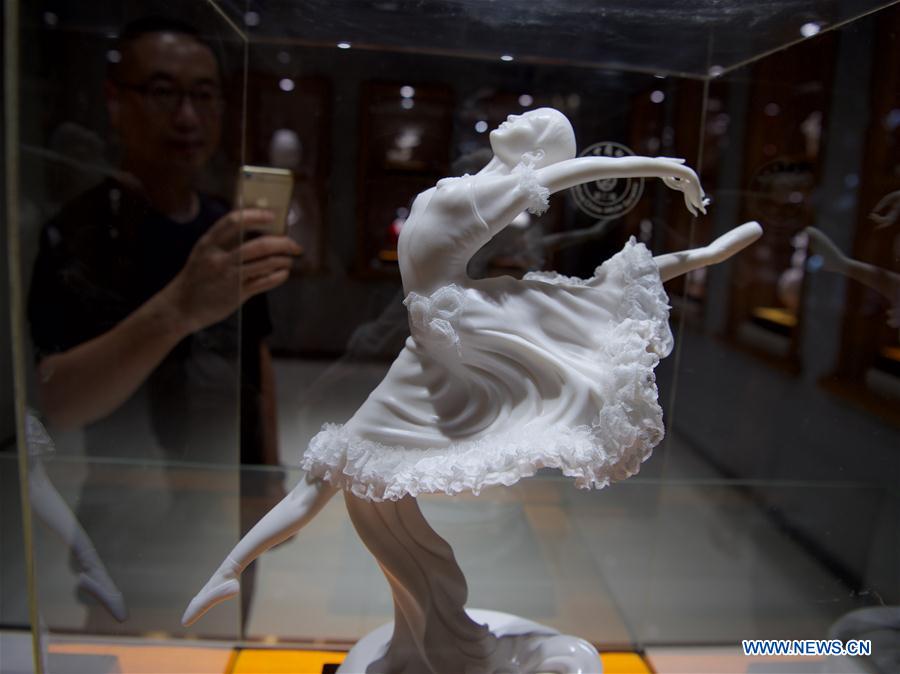World's porcelain factories aim for upgrades with innovation
As one of the hardest-hit sectors during the COVID-19 epidemic, the porcelain industry in Dehua is now gaining new momentum with innovation and diverse business expansion.
Xu Jinbao changed his company's name from "Sanfu Souvenir" to "Sanfu Technology" a couple of weeks ago, so he could expand production from tea sets and vases to air purifiers and water filters.
Xu's company is one of many factories that produce and export Western-style porcelain home decorations and tableware in Dehua county, east China's Fujian province.

A visitor takes photo of ceramic product at a company in Dehua county of Quanzhou, southeast China's Fujian province, May 15, 2018. [File photo/Xinhua]
Dehua porcelain began to thrive in the Song Dynasty (960-1279) when its white-glazed china was first exported to Europe. The ivory white porcelain became most sought-after among European nobility.
The city has retained its fame as the world's manufacturing hub of ceramic handicrafts, but the popular exports have changed from figurines and utensils in ancient times to Halloween and Christmas decorations today.
By the end of 2019, there were more than 3,000 ceramic enterprises in Dehua, employing more than 100,000 people, with a yearly output value of 36.3 billion yuan (about US$5.2 billion).
As one of the hardest-hit sectors during the COVID-19 epidemic, the porcelain industry in Dehua is now gaining new momentum with innovation and diverse business expansion.
Going special
Xu loves to boil tea in a porcelain kettle, the latest product he developed in recent months. By mixing special minerals with clays in a proper ratio, the porcelain becomes heat resistant and can be put on a stove or hot plate.
"It has become so popular that we cannot meet the soaring demand," Xu said. "Perhaps it's because few people have seen a porcelain utensil that can be put on a stove."
Xu, who has already achieved some renown by making teacups, often buries himself in mixing various minerals with clays to develop advanced ceramics. He is now experimenting on air purifiers, of which the filter is made of porcelain and zeolite, a capable absorbent.
"We are building a new plant, where air purifiers will be put into mass production next year," Xu said. "I am confident that the high-tech sector will help double the company's revenue in the next three years."
In the showroom of Fujie Ceramics, Lin Fuwen, owner of the company, was proud to show visitors a large porcelain doorknob, which is twice as hard as steel, and is priced at over 10,000 yuan each.
Lin started his porcelain business in 1991, and managed to make easy money in the 1990s and early 2000s when the export business of cheap decorations was in its heyday. He decided to add more value to his products when he found the profit margin slumped to less than 10 percent due to rising labor costs after 2009.
In 2013, he succeeded in developing a porcelain lamp with good heat dissipation, and since then he has been investing about half of the company's profit into the research of new materials every year.
On the shelves of the company's showroom now are various high-tech porcelain products with startling properties such as high thermal conductivity and high-temperature resistance. Widely used in electronics, medical services and machine tools, the advanced ceramics business has become a cash cow for the company.
"The profit margin of special ceramics is 20 percent higher than that of traditional porcelain products," Lin said, noting that orders for the innovative products doubled year on year in March and April when there were almost no orders for traditional products from overseas.
Going diverse
Snow globes fill the shelves. Frogs and rabbits stare at each other across the passage. A few yards away, Mickey Mouse, Snow White, and Dumbo the Flying Elephant are packed like sardines. They are all made of porcelain.
This exhibition hall, which covers an area of 6,000 square meters, is situated in the factory of the Shunmei Group, one of the largest ceramic exporters in China.
Zheng Pengfei, general manager of the company, said visitors are welcome to craft their own ceramic works and color blank clay models in the DIY workshop.
The factory has become an attraction for tourists visiting Dehua, receiving 1,000 visitors a day on average. It also plans to roll out a tour route inside the factory that allows visitors to explore the whole process of porcelain production.
"More exposure means more potential buyers. Factory tours open the door to a new world for the company," Zheng said.
While some exporters pin their hopes on brick-and-mortar factory tours, some have turned to the domestic market through e-commerce marketing. Instead of placing bulk orders as foreign clients do, domestic consumers tend to purchase customized products in small amounts.
Li Junjie, who runs a ceramic flowerpot plant in Dehua County, did not sell a single pot to his overseas customers during the COVID-19 pandemic. The factory used to export 30 percent of its flowerpots to the United States and Spain, but Li managed to make up for the lost deals by selling on domestic e-commerce platforms.
With big data provided by e-commerce platforms, Li can tell which items will be a hit so they can increase their production of those items, and develop new products based on a thorough analysis of different consumer groups.
"Our online sales almost doubled over the past year, and we have sold over 100,000 customized pots this year, thanks to the e-commerce strategy on the domestic market," Li said.

